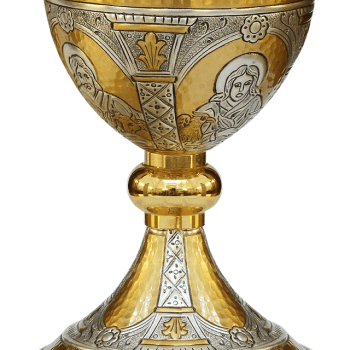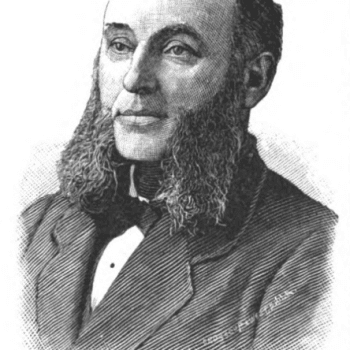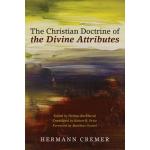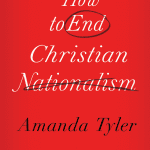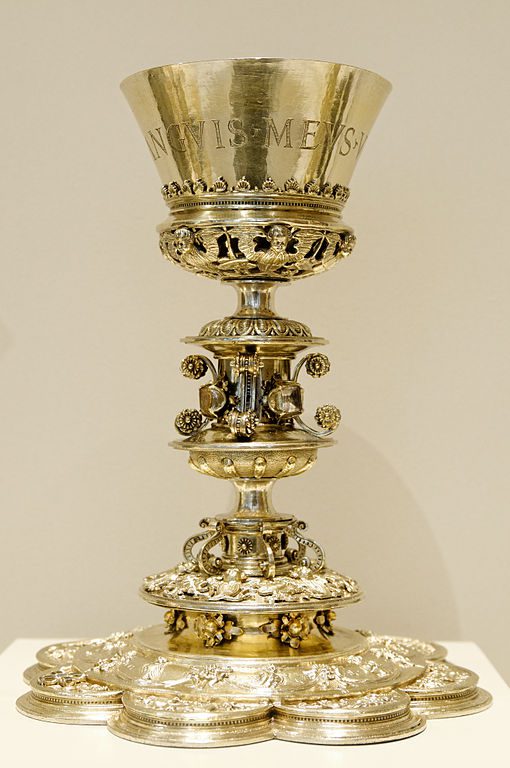
Chalice with the inscription: ‘My blood truly is a libation’ (John 6:55, KJV), made for the church St John the Baptist in Salinas, Spain (1549) [public domain / Wikimedia Commons]
*****
From my book, Biblical Catholic Eucharistic Theology (2011). This chapter is a modified version of a dialogue originally uploaded on 30 January 2003.
*****
First of all (lest anyone be misinformed on this) Catholics certainly recognize Protestants as fellow Christians, who have been validly baptized (provided only that it was trinitarian). Holy Communion is a somewhat different matter. That is a symbol of unity (doctrinal and relational), and such oneness is currently lacking in the Body of Christ. For us to offer communion to anyone without requiring doctrinal consent would be dishonest for us and in our opinion a corruption of communion as a symbol of unity in the Body.
It’s not a matter of “looking down” upon our “separated brethren” but of simple honesty and seeking to be true to what we feel is Christ’s teaching. If it is painful, that is just part of the sad fallout from the schism that was brought upon the Church when the Protestants separated in the 16th century. It ought to be painful for all thoughtful, committed, conscientious Christian who values unity and oneness, as Christ did.
But should anyone decide to become Catholic, they would be immediately welcome at the Lord’s Table (after going through the process of joining). One time before I was received into the Church (but after I had decided to become Catholic), I was asked at Mass to take the bread and wine up to the altar. That was a thrill because I felt I played a key role in the whole service, even though I couldn’t yet take communion.
In John 17:20-21 Jesus prayed for His followers to be “one” just as He was with His Father. Since they were absolutely one in essence, I think that rules out the doctrinal relativism that reigns today in Protestantism, or even the divisions within the Catholic Church (that is, dissidents who aren’t really true, observant Catholics, and who are being dishonest with themselves). At the very least institutional division is biblically forbidden, in my opinion. Denying that is clearly unscriptural.
Catholics believe that Protestants receive the sacramental benefits of baptism and marriage: we acknowledge these as valid sacraments for Protestants. And Protestants obtain grace from partaking in communion at their services, even if the Real Presence is lacking (and many Protestants, of course, think it is lacking and don’t desire to even have it).
A reverential, holy disposition (whatever one believes about the Eucharist) is very pleasing to God. I always took Communion very seriously as a Protestant, even though I didn’t accept Transubstantiation for a second in those days, and I think God accepts that for what it is worth — which is indeed a lot.
The bottom line with regard to this matter of closed communion and the prohibition of non-Catholics from the Catholic Eucharist, is the prerogative of any Christian communion (just as with any civil institution, place of work, the military, government offices, etc.) to make its own rules, and require the observance of them, and adherence to them, in order to gain membership in the fullest sense. This is almost a self-evident truth.
It is unreasonable to demand otherwise, just as Catholics wouldn’t go to some Protestant church service – one that required membership for communion –, and demanded communion because we, too, are Christians like they are. It shows respect to another group when one recognizes that they are entitled to create whatever membership criteria they wish. We extend that respect when we are in Protestant or Orthodox circles; Protestants ought to extend it in Catholic circles, as well.
No personal insult or condescension toward Protestants is intended by their not being allowed to receive Catholic communion; that is simply the way institutions and membership criteria work. People are excluded from all sorts of groups for a variety of reasons; some good, some bad. I see nothing wrong with the Catholic Church’s requirement that a person fully accept its doctrines in order to be received at the Lord’s Table.
Do those who disagree with this policy expect the Catholic Church to change its centuries-old, passed-down doctrine in response to their private opinions of what it should or should not do? That’s just not how it works, according to the Catholic perspective.
The dissidents and nominal Catholics within our ranks also want to change Church doctrine and Church policy, to suit their whims and desires. Homosexual activists want to change the nature of the marital bond, to include themselves. Many Protestants want to take communion in a Catholic Church (as President Bill Clinton did). If someone wishes to become a Catholic, they are free to do so.
Christian unity in Jesus Christ is supremely important, but so also is doctrinal agreement across the board, according to Paul’s statement: “. . . one Lord, one faith, one baptism” (Ephesians 4:5). Now, if someone wishes to argue that this “faith” (Greek, pistis) is simply referring to trust in God and personal commitment to Jesus, as opposed to a doctrinal meaning, as I would contend (for this passage), Greek scholar Kittel’s Theological Dictionary of the New Testament, disagrees:
The Faith. Paul can call the message itself pistis. As such, pistis is a principle, e.g., in contrast to law (Rom. 3:31; cf. 3:27: the law of faith). Along these lines pistis is Christianity either as being a Christian or as the Christian message or teaching (cf. Gal. 6:10; 1:23). Acts 6:7 and Eph. 4:5 offer similar uses, and cf. 1 Tim 3:9; 4:1,6. Orthodox doctrine is pistis in Jude 3, 20 and 2 Pet. 1:1. The phrases in 1 Tim. 1:2,4; 2:7; Titus 1:1,4; 3:5 are to the same effect. (Kittel, 854)
Looking at some of the cross-references listed, we see this clearly:
Acts 6:7 (RSV) . . . a great many of the priests were obedient to the faith.
Galatians 1:23 . . . He . . . is now preaching the faith he once tried to destroy.
1 Timothy 1:2 To Timothy, my true child in the faith . . .
1 Timothy 3:9 they must hold the mystery of the faith with a clear conscience.
1 Timothy 4:1 . . . some will depart from the faith by giving heed to deceitful spirits and doctrines of demons.
1 Timothy 4:6 . . . nourished on the words of the faith and of the good doctrine which you have followed.
Titus 1:4 To Titus, my true child in a common faith . . .
Jude 3 . . . contend for the faith which was once for all delivered to the saints.
Thus, this one verse (Ephesians 4:5) offers a clear connection of at least one of the sacraments (baptism) with acceptance of a common set of doctrines: itself (one faith or tradition) something taught repeatedly by the Apostle Paul elsewhere (1 Cor 15:1-2; 2 Thess 2:15; 3:6; 2 Tim 1:13-14; 2:2).
We observe no relative truths, or central vs. secondary Christian truths, or denominations here; there is but one doctrine, and one accepts it in its entirety or not. Now, if a person wants to argue that this doesn’t apply to the Eucharist, Catholics must disagree (with all due respect) again, because Paul is very clear in 1 Corinthians 10:16 and 11:27-30 that he regards the Eucharist as the literal Body and Blood of Christ.
Moreover, in the context of the eucharistic Pauline passages, we also see his concern for doctrinal and familial unity in the Body of Christ. Six verses before one of these passages Paul writes:
1 Corinthians 11:17-19 But in the following instructions I do not commend you, because when you come together it is not for the better but for the worse. For, in the first place, when you assemble as a church, I hear that there are divisions among you; and I partly believe it, for there must be factions among you in order that those who are genuine among you may be recognized.
Fifteen verses before this passage, Paul mentioned apostolic traditions:
1 Corinthians 11:2 I commend you because you remember me in everything and maintain the traditions even as I have delivered them to you.
And in the very next verse after his strong statement of the Real Presence, Paul talks about unity also:
1 Corinthians 10:16-17 The cup of blessing which we bless, is it not a participation in the blood of Christ? The bread which we break, is it not a participation in the body of Christ? Because there is one bread, we who are many are one body, for we all partake of the one bread.
1 Corinthians 11:2 above occurs 17 verses after this passage. It is all of a piece: doctrinal unity, unity in love, and partaking of the Eucharist. The Catholic view, then, as we see, is eminently biblical: there is one faith, and the Eucharist, as a symbol of this doctrinal unity, is the actual Body and Blood. That is the received faith. If someone doesn’t believe this, they shouldn’t partake of the Eucharist, because it is the central rite of the Christian faith.
This is not to say that all who don’t accept the Catholic belief on this are damned or terrible persons. They are not necessarily at all. Those are separate issues. I am explaining why Catholics believe in closed communion. Whoever disagrees will at least know exactly why we hold to our position. It is a biblical and apostolic tradition, not an oppressive tradition of men that Catholics came up with in order to make outsiders feel miserable and inferior.
We must follow that tradition which we believe we have received; passed down from the apostles. If that offends someone, then there is nothing else we can do. We can’t go against what we believe to be the teaching of our Lord Jesus and the apostles.
Sin can exclude one from a Christian community and its rites, of course, but so can dissent on various beliefs held to be indispensable in those communities (at least with regard to the Eucharist). That’s why virtually every Christian communion holds to a creed or confession. It is specifically intended to outline what that community believes; therefore, by definition, it will exclude those who disagree. The Protestant tendency is to minimize or underemphasize those doctrines where Christians have historically disagreed. Catholics don’t approach it that way, as explained above.
I continue to be baffled as to why this is such an issue for many Protestants. It never was for me before I converted. I never felt excluded because I was not yet a Catholic in belief. And when I was convinced, I converted, and it was a non-issue.
All Christian groups believe certain things. And when one thing is believed, logic dictates that its contraries are excluded and regarded as false. It doesn’t follow that it is prideful to do so. Closed communion is not a denial of mercy at all, but simply a requirement for inclusion into the community, as Paul taught us.
If the critics of the Church are correct about this matter, Jesus should and would have stated in Matthew 28:20, “teach them to observe all that I have commanded you, except for the Eucharist; you must allow anyone with any eucharistic belief to partake of communion.” Jesus “excluded” the rich young ruler from following Him fully because He required him to give up his riches (which were his idols) and the man would not.
Jesus didn’t say, “sure, you can come follow Me whatever you think of your riches; that’s no problem.” It just doesn’t work that way. Demands to receive the Catholic Eucharist without believing all that the Church teaches are unreasonable and unbiblical.
The Protestant tendency is to underemphasize true doctrine in its entirety and to over-emphasize the aspects of fellowship and subjectivity and experience over against doctrine. We are saying that they can’t be separated, and provide a rationale from Holy Scripture. We think doctrinal and ecclesiological unity is more important than Protestants do, and our view on the issue of the Eucharist and who can receive it obviously reflects that. Since Protestants reject the premise underlying our “liturgical rule,” they (some, at any rate) object to our practice. So it is a matter of root premises.
To put it another way, for us to change in this respect would be to adopt fundamentally Protestant presuppositions (which, of course, we can’t do, without ceasing to be true to our own principles and premises). Logically speaking, in this sense non-Catholics who demand to be admitted to Catholic communion are trying to force the Catholic Church to be more Protestant, and, failing that, they sometimes uncharitably conclude that we are obviously “uncharitable.”
To follow the logic through even further, it boils down to: “consistent Catholicism is intrinsically uncharitable to non-Catholics and won’t cease to be so until it becomes more Protestantized.” But (to follow this reasoning to its conclusion): how does one become more “Protestant”? The Protestant (particularly an evangelical) invariably says, “by being more biblical.” We reply, “alright; show us your principles in the Bible.” That gets us, in turn, back to Holy Scripture (and I have supported the Catholic view from Scripture, above).
Protestants need to show how our view is wrong from Scripture, and how theirs is right or preferable, from Scripture. That is the only way we can resolve this, because it offers us an objective standard (the Bible) that we both accept, by which to judge the practice.
It was always the case that the new Catholic had to undergo a lengthy period of catechesis and introduction to the Catholic ethos before being admitted to the Lord’s Table. We can’t simply change that because some Protestants are distraught over it.
Catholics believe that Protestants have many means of grace: baptism, marriage, preaching of the word of God (though not technically sacramental grace), the indwelling of the Holy Spirit, emphases on prayer and evangelism and Bible study, and so forth. I know that firsthand because I lived it myself and will thank God forever for what I learned as a Protestant, and how I developed a relationship with God (much of which is often sadly lacking in Catholicism-in-practice).
But simply because I acknowledge the presence of grace doesn’t mean that I can go into, for example, a Missouri Synod Lutheran congregation and ask to receive the Eucharist, lest I be “excluded” and am therefore “impeded” from the grace that God has for me. I, as a Catholic, recognize their policy of closed communion and respect it (and wouldn’t dream of charging them with a lack of charity, at all).
Secondly, I recognize that Lutherans have a different understanding than we do about the miraculous change in the Eucharist, and that would cause me not to partake as well.
Thirdly, I would adhere to my own Church’s rules about attending other churches and how much we can participate and remain self-consistent and obedient Catholics. I would never feel excluded (it wouldn’t even cross my mind); I would simply respect the honest differences and rejoice in what we do have in common. And I would receive communion in my own church, as one would expect.
If I started to become convinced that the Lutherans had more truth than the Catholics, that would be something else again. Likewise, if a Protestant who seeks the Catholic Eucharist becomes convinced of Catholicism, then their struggle to obtain more grace from the Catholic Eucharist would be over.
We are trying to faithfully follow our Lord’s and St. Paul’s command to adhere to the “tradition,” passed down, and to require adherence for all who desire to join the Church (and its rites): that we consider to be the fullness of the faith and the same Church that Jesus founded, in His commission to Peter.
Certain things require certain other things in order to happen. One can’t be truly forgiven unless one repents. It’s part of the package. What are we to do: allow unlimited forgiveness whether one repents or not (which would entail wiping out hell altogether)? That’s not what Jesus did. He forgave the woman caught in adultery, but He also said, “go and sin no more.”
Are Calvinists supposed to allow other Christians who deny all five points of TULIP to come into their ranks, teach, and participate as fully as anyone else, lest they be perceived as “uncharitable” and deliberate excluders of the widest distribution of grace possible? I think not. Are pacifist Quakers or Mennonites supposed to grant soldiers admittance to their worship services and rites? No.
Must the Amish cease their culturally isolationist ways because they exclude others? No. Are we supposed to “bless” homosexual marriage because if we don’t, homosexuals will be outrageously excluded from the grace of sacramental marriage? Of course not; we cannot change what we are commanded to do. This present case is only one example of many such scenarios.
It is sometimes argued that God is everywhere, so why the objection to Protestants receiving Jesus as present in the Blessed Eucharist? But omnipresence and sacramental Real Presence, are, of course, two different things. The distinction and marvel of the Eucharist is precisely that it is actual and substantial; thus an extension of the incarnation.
Omnipresence does not have that characteristic because it is spiritual and non-corporeal, and applies to God the Father and God the Holy Spirit as well. Only the Son has a body, thus only He is present in the miracle of the Eucharist, because He is the incarnate God.
Some people can’t meet the requirements to get in the military. A seven-foot man is not likely to be a jockey, and a five-foot man will likely not get into the NBA (though a few actually have). One has to meet requirements to enter a college or to be hired at a job, with particular requirements. You have to be 35 to be President of the United States, and 30 to be a Senator.
Likewise, being a Catholic means something intellectually; doctrinally. Many denominations care little about doctrinal distinctives, but we do, and so did all the early Protestants (and, I would say, Jesus and the apostles and Church fathers). We presuppose a doctrinal unity. Taking communion is being part of the Catholic Church. Therefore, one who doesn’t agree with Catholic teachings cannot partake.
The contrary attitude perhaps has something to do with a sort of theological relativism (I’m now speculating as to its ultimate cause). This is the thinking that holds that we’re all in the same boat and that honestly held differences don’t matter anymore. But this is an insult to all the men and women of any Christian stripe who lived and fought and strove for the promulgation of the distinctive beliefs that they truly believed in with all their hearts and souls (some even dying for those faiths and visions).
In the past (including all of the early Protestants), people at least recognized that there was one truth, and that one had to argue and contend about that truth (Jude 3). They didn’t just say it was irrelevant, and that anyone who named the name of Jesus could receive the Holy Eucharist, even if they had a heretical notion even of Who Jesus was.
Being tiffed and miffed because some Christian group says we can’t receive communion with them is both irrational and also arguably dishonest. If a person can and does reject Catholic claims of authority altogether, why does the same person often not recognize also that the Catholic Church can consistently reject his assumed arguments for receiving the Eucharist in a Catholic Mass? He doesn’t set the rules for this body that he rejects; they do! So why in the world would this offend him?
Should I hold a grudge against Harvard Law School my entire life, if I didn’t meet the requirements to get into the school? Are they supposed to bend their entire rules and “tradition” just so I can come in and not be offended? It makes no sense. The two propositions don’t go together.
This is not solely a “Catholic matter” when all is said and done, but a question of every Christian group’s prerogative to set its own rules of entrance and participation. To be a member of a Christian group is (by definition and essence) to believe certain things: to give assent to them. And these include practice and questions of who receives Holy Communion and when, and after how much preparation.
*****
Meta Description: Extensive treatment of this question, that frustrates & offends many non-Catholic Christians. Our view is quite biblical & reasonable.
Meta Keywords: closed communion, Holy communion, Protestants & Catholic communion, Eucharist, The Mass






